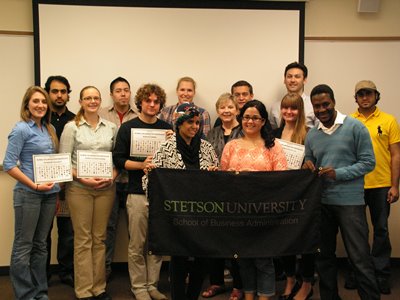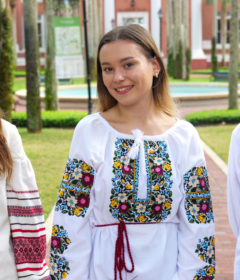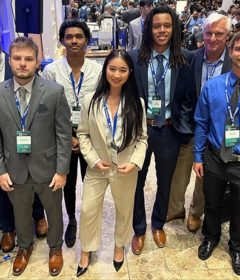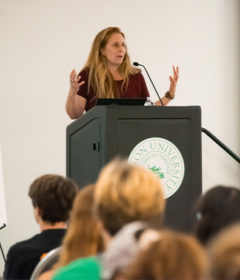X-Culture tests students in virtual world
 Cross-cultural chops aren’t a prerequisite for MGMT 405. Neither is solid coping skills, nor even a bit of moxie. But those traits can be pretty helpful if you’re faced with something of an acid test management assignment.
Cross-cultural chops aren’t a prerequisite for MGMT 405. Neither is solid coping skills, nor even a bit of moxie. But those traits can be pretty helpful if you’re faced with something of an acid test management assignment.
Which is exactly what faced 15 Stetson University business students after they signed up for a Cross-Cultural Dynamics and Management course. (Photo courtesy of Lynn Thompson, administrative assistant in the School of Business.)
Each student joined a different virtual team of half a dozen other students from diverse global cultures. Teams had a single task: collaborate to create a high priority, real-world business plan.
The two-month exercise is called X-Culture, a project created in 2010 by a North Carolina business professor. Last fall, 2,000 students from 81 universities in more than 40 countries took part in the X-Culture project, which partners with businesses small and large, including Daimler Corp. and Home Depot. The idea is that students will learn the challenges and best practices of cross-cultural, virtual collaboration while developing solutions for corporate partners.
Challenges were obvious.
The exercise was totally virtual; team members never saw one another face-to-face, but worked online. Teams were extremely diverse. Members hailed from different continents, spoke different languages and had different customs, ethics, proficiencies, and expectations.
At first glance, the whole notion was daunting, said junior Altheer Alharibi, a finance major from Saudi Arabia whose thoughts were echoed by classmates. Communication challenges alone were a steep barrier, she said, and the likelihood of success seemed remote at the start.
“We had good moments and bad moments,” said Joshua Miller, a junior marketing and management major. “With a project on a scale like this, you are bound to run across problems,” but all were learning experiences, he said.
“The biggest challenge most of us faced was being on a team with other students who did not contribute,” said Claudia Redinger, a senior from South Africa.
Communication and commitment were critical issues in the exercise chosen by their professor, Carolyn Mueller, Ph.D., a management and international business faculty member since 1999. She and her students said the experience not only spotlighted many difficulties to overcome in global collaboration, but meaningful ways to cope with those issues.
Mueller said she was impressed with students’ determination, work ethic, compassion and flexibility. Many took a team leadership role. All earned an X-Culture certificate.
“I wanted students to have an experience that would help them understand the real-life challenges of working with people from other countries and cultures,” said Mueller. “I wanted them to learn to deal with unexpected events, and work and learn from handling pleasant – and sometimes not so pleasant – experiences with teammates.”
Although team relationships were virtual, students’ frustrations were quite real. As was aggravation, annoyance and disappointment. Not all global team members pulled their weight and Stetson students’ frank evaluations mention lack of commitment, failure to respond, rude behavior, neglecting work and even plagiarism.
One of Miller’s team members vanished (virtually) during the exercise. So did others. When it happened to Redinger’s team, students just closed ranks, kept its focus, and picked up the pace and unfinished work to meet deadlines as the plan took shape.
In the end, positive aspects usually outweighed negatives. Students reported meaningful achievement and personal understanding that made efforts worthwhile.
“I learned many lessons from this project,” said Miller, “from being open minded, working in a completely online setting, and conversing with people from different cultures and learning about the way they live and think.
“It was one of the best learning experiences ever,” said Alharibi.
“Although the project was challenging and time-consuming, it was a great opportunity and beneficial,” said Redinger, “especially in today’s business environment where we’ll be working with people from all over the world.”
Mueller was a team evaluator in October at X-Culture competitions during the Academy of International Business’ Southeast conference in Atlanta and hopes Stetson students can attend the 2014 conference in Miami.
Distance and language issues were generally overcome by students using online tools like Skype, Dropbox, Google, or Facebook to meet, plan strategies, and share documents and research. Another essential ingredient was Mueller’s weekly mentoring sessions where the class shared experiences and helpful strategies.
“Everyone had opportunities to share their successes, vent their frustrations and help each other,” said Mueller, who noted none of her students were competing with one another. “The sense of camaraderie was great to watch.”
Will she use the exercise again?
“Yes. Definitely. The semester was a learning experience for all of us,” said Mueller. “ I understand much better how to lessen some of the frustrations that we encountered and mentally prepare students for the interactions, and sometimes lack of interaction, that they face.”
By Ronald Williamson



